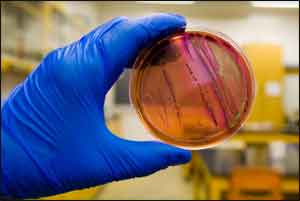- Home
- Editorial
- News
- Practice Guidelines
- Anesthesiology Guidelines
- Cancer Guidelines
- Cardiac Sciences Guidelines
- Critical Care Guidelines
- Dentistry Guidelines
- Dermatology Guidelines
- Diabetes and Endo Guidelines
- Diagnostics Guidelines
- ENT Guidelines
- Featured Practice Guidelines
- Gastroenterology Guidelines
- Geriatrics Guidelines
- Medicine Guidelines
- Nephrology Guidelines
- Neurosciences Guidelines
- Obs and Gynae Guidelines
- Ophthalmology Guidelines
- Orthopaedics Guidelines
- Paediatrics Guidelines
- Psychiatry Guidelines
- Pulmonology Guidelines
- Radiology Guidelines
- Surgery Guidelines
- Urology Guidelines
Rapid, accurate Salmonella test available to handle food-borne illness

A new test allows accurate, rapid testing for Salmonella, a bacteria that is one of the leading causes of food-borne illness across all regions of the world. Salmonella can infect animals as well as people, with commonly reported cases of people falling sick after handling pets and livestock.
Tests that used to take days now take 24 hours, with a hundredfold improvement in detection for at least one type of Salmonella called Salmonella Dublin that is an emerging concern and is difficult to grow in culture, making diagnosis difficult.
The new method, first developed for automated food safety testing and then adapted by Cornell scientists for a wider range of sample types, can detect the bacteria from environmental and clinical samples, including swabs, feces, milk and blood.
The test improves diagnosis time from as many as five days using current procedures, according to a recent study published in the Journal of Veterinary Diagnostic Investigation.
"Because we have this 24-hour turnaround time with the new test, there are veterinary hospitals and clinics that can test and get results rapidly and make sure they are not exposing other animals to Salmonella," said Belinda Thompson, assistant clinical professor at the Animal Health Diagnostic Center and a senior author of the paper.
Fast clinical diagnoses also allow veterinarians to quickly quarantine an infected animal.
Salmonella Dublin is "host adapted" in cattle, meaning infected animals can become permanent or long-term carriers, putting herd mates, especially susceptible calves, at risk. This strain can infect people who may be exposed by contact with infected animals, by drinking raw milk, or by consuming other contaminated food products. In humans, SalmonellaDublin has higher hospitalization and fatality rates than other Salmonella types; it causes systemic infection of body tissues, similar to typhoid.
"Salmonella biosurveillance in veterinary facilities is critical because animals can shed the bacteria without showing clinical disease signs," said Laura Goodman, a senior research associate in the Department of Population Medicine and Diagnostic Sciences and lead author of the study. Goodman added that the method described in the study is now available as an environmental testing program through the Animal Health Diagnostic Center.

Disclaimer: This site is primarily intended for healthcare professionals. Any content/information on this website does not replace the advice of medical and/or health professionals and should not be construed as medical/diagnostic advice/endorsement or prescription. Use of this site is subject to our terms of use, privacy policy, advertisement policy. © 2020 Minerva Medical Treatment Pvt Ltd